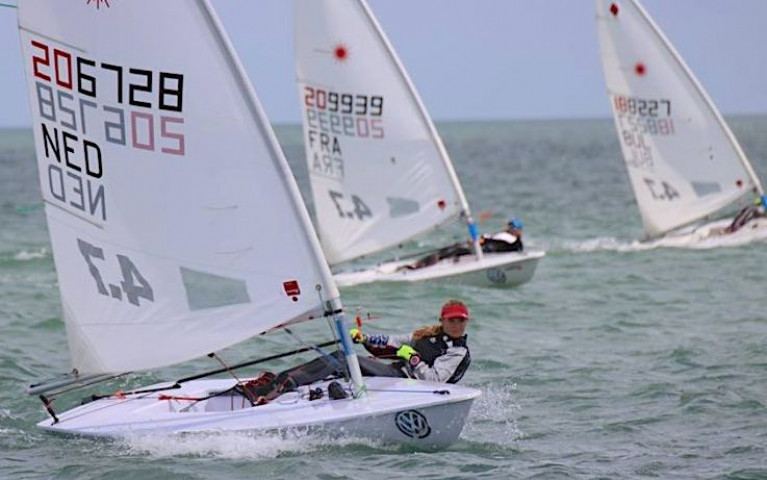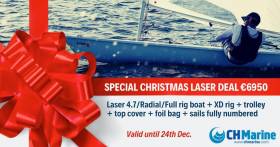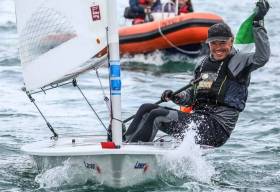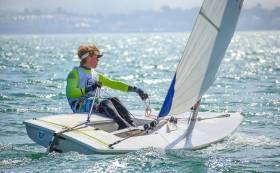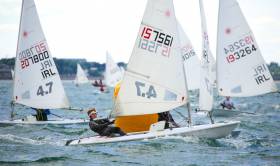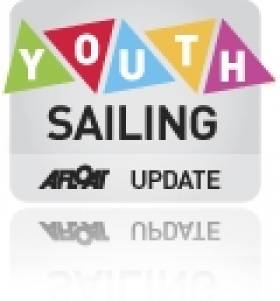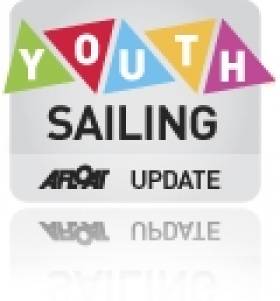Displaying items by tag: Laser 47
Laser 4.7 World Championships Gets The Green Light for Dun Laoghaire Harbour This August
After months of doubt as to whether Covid related travel restrictions would prevent the Laser ( now known as the 'ILCA' 4.7) World Championships from going ahead in Dun Laoghaire Harbour, the organisers have confirmed the August event is proceeding.
The event is being co-hosted by the National Yacht Club and Royal St. George Yacht Club from August 7th to 14th.
Entry offers will be limited to 240 total (140 boys / 100 girls) to maintain a single course with four starts. Current applications are running at 135 boys / 90 girls.
"The final piece of the jigsaw that allows us to proceed is the announcement that from July 19th travellers from the EU and the US will be able to enter Ireland without any quarantine or self-isolation requirements provided they are vaccinated or have a negative PCR test", event chairman Ian Simington told competitors by email.
As it was with the 301-boat Laser Masters Worlds in Dun Laoghaire in September 2018, the huge administrative challenge ashore and afloat is being undertaken in full partnership by the Royal St. George Yacht Club and National Yacht Club. In fact, with boat numbers this size, it becomes a true Dun Laoghaire Harbour communal effort in order to keep everything on track, with Ian Simington heading a central committee which in turn is supported by several specialist sub-groups.
More from Winkie Nixon who wrote about the event planning back in January here
Royal St George & National Yacht Clubs' Laser 4.7 Youth Worlds 2021 Battle on Despite Post-Pandemic Uncertainties
At one stage last Autumn, it looked for a week or two as though Irish venues might be hosting no less than five World Championships for dinghy classes during the three week period between the July 24th and August 14th 2021. But since then, as the only certainty in this rolling pandemic has proven to be uncertainty itself, two events have been shunted on into 2022.
However, the biggest 2021 Worlds of all in Ireland - the Laser 4.7 Youth Worlds at the Royal St George YC and the National Yacht Club from 7th to August 14th – has this week confirmed that the Organising Committee chaired by Ian Simington is pressing on with planning in the assumption that the event is going to take place. Entries will open at the end of the first week of February.
Being a typical Laser mega-event, most entries will be invitation-only on a national qualification basis. But as these regattas are planned on the expectation of accommodating between 300 and 400 boats, there's a good chance that extra places will be available for keen young Irish sailors determined to take part if at all possible, and the word is that already there's no lack of names wishing to be considered.
 Laser 4.7s enjoying the kind of weather and racing that is planned for Dublin Bay in August…
Laser 4.7s enjoying the kind of weather and racing that is planned for Dublin Bay in August…
In an event of this stature and magnitude, the behind-the-scenes work is almost immeasurable, with the fact of it being in Ireland providing unique difficulties in the countdown period. While we go along with enthusiasm in support of the view that Ireland is a small island at the centre of the world, there's no doubt that in trying to see our way towards and through the post-pandemic revival of international sailing events here, our glorious island status poses extra problems.
For sure, major offshore racing events avoid many of these through the simple fact that the boats get here on their own, and if needs be can take part – provided they're certified and scrutineered - without any direct inter-personal shoreside contact whatever. However, with the more popular dinghy classes, not only is there the need for cross-channel ferry access and subsequent road-trailering to the venue, but there's the usual attractive element of it being a family venture, with two or even three family-campaigned boats being supported by a veritable tribe of related supporters, who see the big championship as the focus of a family holiday.
This is one of the reasons why two dinghy World Championships planned for Ireland in 2020 – for the GP14s and the Fireballs - were cancelled so promptly. The feeling among the class associations was that if it couldn't be a lovely big community party in addition to being a white-hot sailing competition, then it really wasn't worth thinking about 2020 at all, and the best thing was to start planning towards 2021 immediately.
 Mirror Championship at Sligo, venue for the Worlds in August 2021
Mirror Championship at Sligo, venue for the Worlds in August 2021
Thus there was a crazy if brief period back in the Autumn when the most extreme optimists were thinking that Ireland might be hosting no less than five World Championships in 2021. In terms of boat numbers, the biggest – long since set in the calendar - was almost inevitably going to be these Laser 4.7 Youth Worlds at the Royal St George YC and National YC in Dun Laoghaire, and equally long term was the Mirror Worlds at Sligo from August 2nd to 8th.
But then with the GP14 Worlds 2020 at Skerries dropped for 2020's shutdown yet with 2021 still held out as probable, and with the same approach for the Fireball Worlds 2020 at Howth, we'd the possible 2021 Worlds listings up to five, as in June 2020 the Toppers had booked in their big one for the Royal Cork Yacht Club from July 24th to 30th 2021.
The family holiday nature of these five major events was emphasised by their timing right in the middle of the main holiday season, for with the GPs and Fireballs talking in terms of late July and early August, we were going to get a hectic mosaic of World Championships starting with the Toppers in Cork and the GP14s at Skerries around July 24th, and concluding with the last Laser 4.7 races at RStGYC in Dublin Bay on August 14th.
If this off-the-wall "Five Worlds in Three Weeks" scenario had come to pass, one could imagine that personnel resources of qualified race officials might have been severely stretched. But it very quickly did indeed prove to be off-the-wall, as the GP 14 International Association continued to monitor the pandemic situation, and then in tandem with the Irish Association and Skerries Sailing Club, they moved their entire circus on another year to 2022. As for the Fireball Association, they have now decided to skip 2021 as they had to skip 2020, and their next worlds in 2022 will be in Australia at Geelong from 7th to February 18th, which is – when you think of it – simply a slight extension of 2021 by other means.
 Toppers in action on Belfast Lough. If their 2021 programme goes according to plan, they'll be holding the Worlds at Crosshaven in late July, followed a few days later by the UK Open Nationals at Ballyholme.
Toppers in action on Belfast Lough. If their 2021 programme goes according to plan, they'll be holding the Worlds at Crosshaven in late July, followed a few days later by the UK Open Nationals at Ballyholme.
Meanwhile, the Toppers are hoping to shape up with an all-Ireland caravanserai, as their Worlds at Crosshaven will be closely succeeded by the UK Nationals at Ballyholme. We can only guess at what the logistical permutations might be like in getting across what is now an EU border in a hopefully post-pandemic situation. But meanwhile, across in Dun Laoghaire, the big Laser event will be emerging rock-like from seas which - for many of us - are at the moment decidedly confused.
Certainly, there's quite head of steam building up, as the 2020 Laser 4.7 Worlds at Arco on Lake Garda, having initially been postponed, were ultimately cancelled, so as a form indicator we have to go back to Canada in 2019, and the huge Laser regatta at Kingston, Ontario.
That was when the main Irish impact was in the Laser Radials, with Eve McMahon taking the Bronze, but in the Laser 4.7s it was either the Mediterranean or Eastern Europe setting the pace, with Niccolo Nordera from Italy winning from Roko Stepanovic of Croatia, with Slovenia's Gasper Strahnovik getting third, while the Girls Fleet was won by Anja von Allmen from Switzerland, with Lara Himmes of Spain second and Sara Savelli of Italy third.
As we lost the 2020 Irish Laser Championship in August's short season through storm conditions, the most recent Laser 4.7 results we have in Ireland are from 2019, when Cillian Foster of Royal Cork won the class in the Irish Youth Pathway Nationals from Alana Coakley of Royal St George, with Emily Riordan (RStGYC) third, and two National YC helms - Hugh O'Connor and Conor Gorman - in fourth and fifth.
 Front of house….this is the façade which the 1838-founded Royal St George YC presents to the town of Dun Laoghaire
Front of house….this is the façade which the 1838-founded Royal St George YC presents to the town of Dun Laoghaire
 …..but the real action is "round the back", with RStGYC hosting a Laser event with their National Yacht Club neighbours (below)
…..but the real action is "round the back", with RStGYC hosting a Laser event with their National Yacht Club neighbours (below)

For young sailors, 2019 is now aeons ago, so the anticipation levels for this August regatta are running at a stratospheric level. For a man at the eye of the storm, Ian Simington remains remarkably calm. But then, in addition to being a Laser sailor himself as well as campaigning a J/80, he has wide experience of event organisation including four years at the sharp end of Optimist organisation, which is not a place for the faint-hearted.
However, as it was with the 301-boat Laser Masters Worlds in Dun Laoghaire in September 2018, the huge administrative challenge ashore and afloat is being undertaken in full partnership with the National Yacht Club. In fact, with boat numbers this size, it becomes a true Dun Laoghaire Harbour communal effort in order to keep everything on track, with Ian Simington heading a central committee which in turn will be supported by several specialist sub-groups.
 At the heart of it – Ian Simington brings extensive experience to his role as Chairman of the Organising Committee for the Laser 4.7 Youth Worlds 2021.
At the heart of it – Ian Simington brings extensive experience to his role as Chairman of the Organising Committee for the Laser 4.7 Youth Worlds 2021.
And in addition to the calming effect of his wide experience, he knows that the strong Irish club tradition will provide a host of volunteers ready for any useful role which can help to keep this vitally important World Championship running smoothly to remind us that no matter what size of a sail you put on a Laser, it still looks like – and is - a great boat
 The Laser Lineup – still a world-beating set of options after more than fifty years
The Laser Lineup – still a world-beating set of options after more than fifty years
Laser Dinghy Christmas Specials From CH Marine
As the days tick down to Christmas 2018, CH Marine Chandlery still has some special deals on Laser dinghies — but act fast as these offers are only available till Monday 24 December.
For just €6,950 (£6,185.50) including VAT you could have a standard Laser, Radial or 4.7 with XD rig and composite upper.
And that’s not all, as the price includes a trolley, top cover and foil bag, with sails fully numbered.
These popular packages have been selling fast and as of this morning (Thursday 20 December) there is only one Laser 4.7 deal remaining. If it’s what you’ve been looking for, don’t be disappointed this Christmas!
Be sure also to check out CH Marine’s daily deals on Facebook in the run-up to Santa’s arrival. Today you could save €70 on a Crewsaver Ergolift Offshore Lifejacket Auto 190N with light and hood.
Shop online at CHMarine.com or in store in Skibbereen, Cork and Newtownards — open from 9am to 2pm on Christmas Eve for any last-minute stocking-stuffers!
A Boat For All Ages? Surge Of Laser Radial Entries In 2018 DMYC Frostbites Boosts Ranks With Youths, Women & Older Sailors
More than 40 Lasers have been registered thus far for the DMYC Frostbites, with entries still open online ahead of the series kickoff this Sunday 4 November.
The tally of 46 pledged for the latest Dublin Bay winter series is already way up on last year’s total — and even more interesting is that 24 of them are Laser Radials, showing a boost of interest among women, older and youth sailors.
In particular, the Dun Laoghaire Combined Clubs’ youth training programme is sending as many as eight Radials to this year’s Frostbites, along with a group of 4.7s.
It’s being hailed as a positive sign for the class which has long experienced difficulty in persuading parents and coaches to encourage their children to compete in local racing rather than training.
The impact of the recent Laser Master Worlds in Dun Laoghaire will also be felt with a strong contingent of older sailors in the Radial class this year.
With the final numbers looking to be a field that’s one-third Laser Radials, it could be marking the resurgence of the class often thought of as only a youth boat as one for all ages.
Conway, Bateman & Kohl Top 2018 Laser National Rankings
#Laser - Fionn Conway, Chris Bateman and Atlee Kohl top the tables of their respective fleets in the final Laser class national rankings for 2018.
In the standard rig, the National Yacht Club’s Conway stormed ahead of names very familiar to Afloat.ie readers, from Liam Glynn (3rd) to Ewan McMahon (11th) and Johnny Durcan (14th), to list but a few.
In the Laser Radial, Royal Cork sailor Chris Bateman’s strong results at this year’s regionals put him clear of a strong youth fleet — Jamie McMahon (5th), Aisling Keller (7th), Michael Carroll and Michael O’Suilleabhain (2nd and 9th) included.
And in the Laser 4.7, Bateman’s 29er partner Atlee Kohl ends the year eight points ahead of class newcomer Alana Coakley.
Royal St. George Sailors Star in Irish Sailing's Laser 4.7 Team
Three of the five youth sailors named by Irish Sailing for its 2018 Laser 4.7 team are from the Royal St. George Yacht Club in Dun Laoghaire Harbour.
Royal St. George's Alana Coakley, Charlie Cullen (also National Yacht Club) and Finn Walker all make the team that will have its first training camp on the 12th of May.
The full team announced is:
Alana Coakley - Royal St George Yacht Club
Charlie Cullen - National Yacht Club & Royal St George Yacht Club
Ellie Cunnane- Dingle Sailing Club
Conor Horgan - Royal Cork Yacht Club & Baltimore Sailing Club
Joseph Karauzum - County Antrim Yacht Club
Finn Walker- Royal St George Yacht Club
This year the Laser 4.7 team will compete in the class World Championships in Gdynia, Poland.
The aim of the Laser 4.7 squad is to introduce team members to the skills needed to be part of a team preparing for an international regatta.
Domestic training weekends will build towards the World Championships, working with coach Debbie Hannah the team will focus on event preparation, building their tactical and technical knowledge prior to departure.
In July the team will travel to Poland to proudly represent Ireland following the hard work they have put in at home.
With Gydina being Poland’s premier sailing venue it is likely that these sailors will return here again in another class, so everything learned on this trip will be valuable in the future.
#laser4.7 – At the Laser 4.7 European Championships in Norway, two National Yacht Club (NYC) sailors scored impressive results in both the boys and girls under 18 fleets. While 2013 Irish champion, Daniel Raymond was 22nd in his 60–boat Gold fleet it was the performance of his clubmate Nicole Hemeryck that stole the show. The former Topper girl posted results of 4 4 3 (16) 6 2 4 (12) 7 6 7 9 to finish fourth overall after 12 races and two discards in her 48–boat fleet.
The National Yacht Club pair were part of an Irish team racing from the city of Moss, located in the south-eastern part of Norway, approximately 65 kilometers south of Norway's capitol, Oslo. The championships enjoyed fine sailing conditions, sunny and 25 degrees with winds up to 20–knots, just like Dublin Bay!
Full results are here
Laser Regional Squads Announced
#laser – The Irish Sailing Association (ISA) has announced 2014 regional Squads for the Laser 4.7 & Radial.
Leinster Radial Squad: Sandy Aplin, Mark Bolger, Patrick Cahill, Chloe Eggers, Ciaran Finnegan, Jack Higgins, Aoife Hopkins, Luke Murphy & Dougie Power
Munster Radial Squad: Eva Donworth, Thomas McGrath, Dara O'Shea, Scott O'Sullivan & Richard Thompson
Leinster 4.7 Squad: Evie Byrne, Nicole Hemeryck, Richard Hogan, Conor Kneafsey & Conor Sherriff
Munster 4.7 Squad: Jack Carroll, Billy Duane, Johnny Durcan, Luke Horgan, Florence Lyden, Luke McGrath & Jamie Tingle



























